If Binary Domain is to be believed, 2080 will see the unveiling of some robot-building evil mastermind that has been plotting the potential downfall of humanity for some time. The truth is revealed when a disgruntled humanoid discovers that they are a “Hollow Child” robot and rips off its own face in protest. The US and international governments want answers, aight? In the story, America has become the dominant superpower in the field of robotics, owning 95% of the world’s robotics industry, with only have the other 5% as suspects and attention is focused on Japanese robotics company named the Amada corporation. Binary Domain tells the story of the squad of international teammates sent into Japan to find out who has built these human-mimic machines and stop whoever is breaking article 21 of the New Geneva Convention, which states that robots can not be made to look fully human.
• Developer: Yakuza Studios
• Publisher: SEGA
• Reviewed on: PS3
• Also Available on: Xbox 360
• Release Date: Feb 28 US / Feb 24 Europe

Japanese game developers have struggled to sell to Western audiences in recent years. The West seems to have fallen out of love with the Japanese role-playing game and with the exception of the fighting game, most genres now have clearly more popular examples developed outside of Japan. In fact the story of Binary Domain itself could be arguably be considered an allegory for the recent shift power to the West. To combat this trend, developers (or publishers) have recently often looked to have many traditionally Japanese games made outside of Japan, with titles such as the Spanish-developed Castlevania, Canadian-developed Dead Rising 2 and the latest Devil May Cry, which is being developed in the UK. Binary Domain is a third person tactical shooter that was produced in Japan, but clearly made for Western audience.
Yakuza Studios, had previously produced the Yakuza series of games — a sort of Japanese GTA — that were very popular in Japan, but not as popular in the rest of the world. This is clearly something that director, legendary Toshihiro Nagoshi, has chosen to address when producing Binary Domain. There are some overtly obvious influences from very popular Western games. The two games that most prominently and frequently spring to mind while playing: Gears of War (stop-and-pop, cover mechanic gameplay) and Mass Effect (team-building, morality and decision-making). There are echos of Western movie and literary references, with I, Robot, Terminator and Blade Runner being the most obvious. That said the story actually most reminds me of classic Japanese Anime, Ghost In The Shell. More than once while playing the game, I referred to it as Gears In The Shell. It is a fairly apt summation.
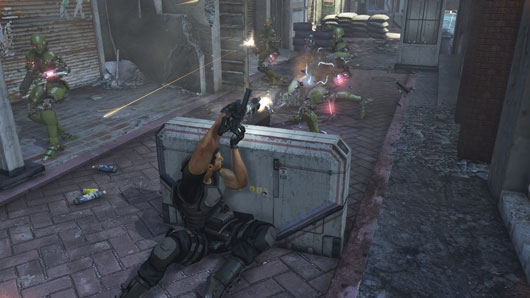
Saying that a Japanese game comes with emotional options will throw up flashbacks of the worst underage Japanese schoolgirl dating sims imaginable, but Binary Domain attempts to play with your emotions rather than pervert them. The most difficult or annoying person to deal with on your team is arguably the best team member to have with you at all times, as he can provide the best medical care. People you keep close to you may also cause you problems and the story deliberately plays on the notion that anyone could turn out to be a Hollow Child at any point in time.
“They look just like us! They are even programmed to think that they’re human.”
The single player game heavily features a voice interface that allows you to issue commands to your squad mates and respond to them in conversations. Alternatively this can be done via button presses, which I had to default to as I do not have a PS3 headset. You can also call for medical assistance, although the additional mechanic of being able to heal yourself is welcome, especially as they may not always come to your aid. This may be because they are stuck in combat, but it may be because they don’t trust you. Your squad mates operate on a trust rating. Shooting them in the back is the fastest way to lose a teammate’s trust, but trust can be gained or lost by your actions in battle and your response to teammates in conversations. This then has an effect on how willing a squad member will be to follow the orders you issue them in combat.
I was not too keen on the story to start with. Early portions of the script seemed clunky and especially Bro-tastic, “aight?” The moments where you can respond with the microphone seemed to slow down the action and disrupt the flow of story more than they helped. This became less of a problem as the game progressed. The voice acting and script either improved or just became less jarring as I became used to them, but either way the story really comes together in the last third of the game, drawing all the story threads together and doing a really good job of making me think about some of the moral and social implications of the development of Artificial Intelligence. Hardly a totally original story, but it is told much more expertly, elegantly and interestingly than many of its peers and much more so than some of its opening scenes would suggest.
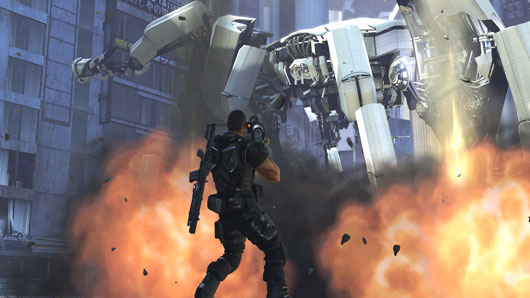
Gameplay is varied throughout and does a good job of pacing sections of standard cover mechanic shooting with these variations. Boss fights don’t feel that they are always just stuck at the end of every level, and the final moments of a chapter may see you rescuing a team mate rather than dealing with an even bigger robot again. When the gameplay flicks to a different style — such as sliding down a waterside style chute while escaping or using a fixed gun turret — controls are generally solid, enjoyable and rarely if ever out stay their welcome. The only elements of control I wasn’t keen on were some of the quick-time event elements. QTEs were generally fine and often added to the excitement of dodging a falling building or jumping from a moving train, but I found the do-or-die golf swing style bar a bit annoyingly difficult to deal with. I like the idea of it, but I found that I had to replay these sections a few too many times. That could just be my slow reactions though. If videogames have taught me anything, it is that if I am ever exposed to a do-or-die situation in real life, I may need a couple of retries (or most likely have to opt for the “or-die” option!).
There are also online competitive and cooperative multiplayer (for up to 10 people). The co-op mode is called Invasion and sees you facing waves of increasingly difficulties in a standard horde-style. Points earned from robot-slaying can be spent on equipment and upgrades to help you survive longer on the battlefield. I had a small issue with host migration meaning that we had to repeatedly restart waves if the server lost connection with the host, and it did appear that the waves didn’t scale down for smaller parties. However, the solid game mechanics follow over from the main game, and the in-game character chat system facilitated coordination and communication with my team — even though I didn’t have a headset). I did not go to in depth with the multiplayer, but what I saw was nothing to set the world afire in terms of originality or stand-out gameplay; however, it could be some fun to play with or against your friends once you have finished with the single-player game.
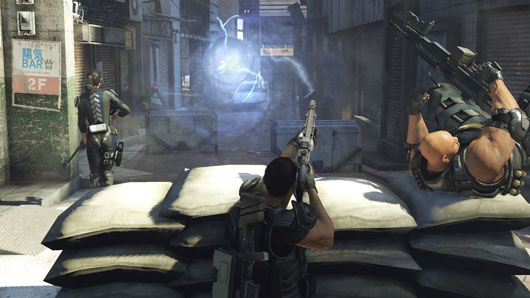
Binary Domain reminds me of Vanquish, which was also published by SEGA. The difference being that Vanquish felt like a Japanese game with a Western lick of paint — Bayonetta with a robotic cyber skin. Binary Domain seemed like it was designed and conceived from the ground up to, not just appear like a Western game, but to actually be one. Japanese people designed and produced this game, but Western audience (and their desires) helped build it. It certainly appears all the better for it, and while I have an appreciation for some of the zanier side of Japanese videogame culture and have also really enjoyed games such Bayonetta, Vanquish and El Shaddai in recent years, Binary Domain is likely to appeal to a wider audience. That could well be you. How much you trust my recommendation may depend how many times I have shot you in the back lately.
Well, hey, you might be a robot.
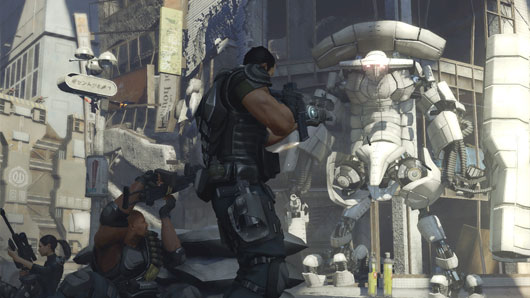
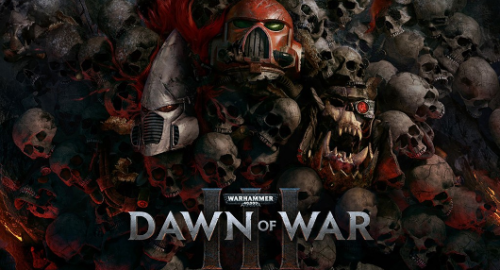
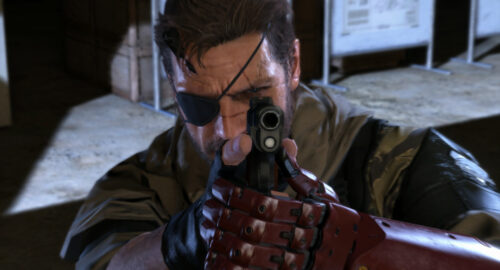

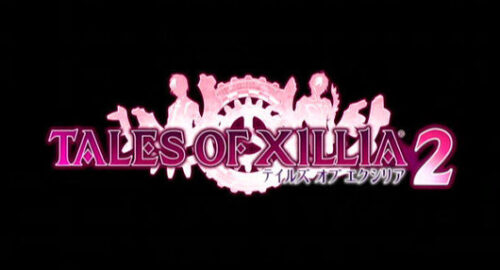
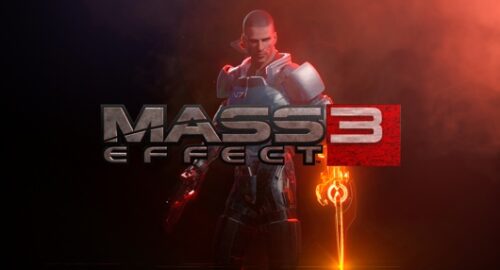
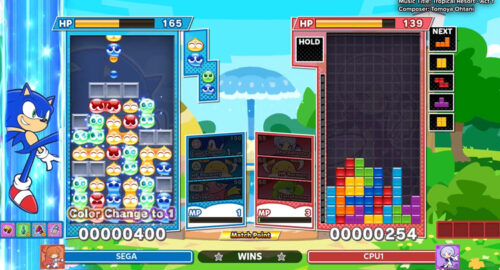
Darth Nutclench
Nice review (perhaps add a headset to your Amazon wishlist?). I really enjoyed Vanquish and eagerly played through the demo of BD. Had to say it was a lot of fun, liked all the exploding robots. With the release of SSX and ME3, I may wait for this to hit the bargain bin and play it later on in the year. Good to see our Japanese friends are finding a way to deal with declining sales of their western exports.
Lukas Heinzel
To release this game besides Mass Effect is Suicide Grande.
Captain Hindsight
I’ve always been skeptical of this game as I hate really dumb (or possibly lost in translation) dialogue. I find it very jarring to the overall story when the personal interaction with your team leaves me cringing. This not only goes for Japaneses games, but also games like gears of war where you play (and are surrounded by) massive dicks. I can already see this game isn’t for me this was a good review none the less!
de4dngone
Well got this on release and its been great better than gears and me3 de o was crap, this has a socom meets gears feel and no stupid gears running. Story great multiplayer needs teamwork and survival can be very challenging for a good team
Must buy game, ditch me3 and get this.